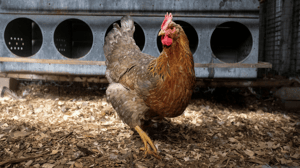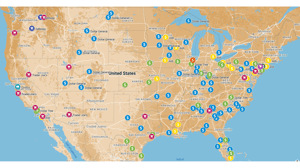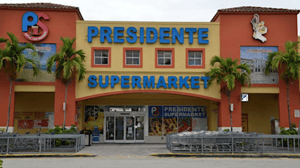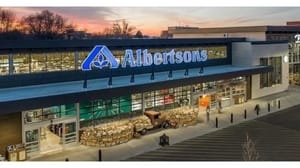Transforming Tech
Last month, Supervalu reported disappointing results for its fiscal year's second quarter, which ended Sept. 6. In what has been a historically bad economic climate for retailers, the Minneapolis-based retail and wholesale giant's same-store sales slipped 1.3%, while its profits plummeted 13%. But whatever its short-term difficulties may be, Supervalu has made two major investments over the past few
November 17, 2008
MICHAEL GARRY
Last month, Supervalu reported disappointing results for its fiscal year's second quarter, which ended Sept. 6. In what has been a historically bad economic climate for retailers, the Minneapolis-based retail and wholesale giant's same-store sales slipped 1.3%, while its profits plummeted 13%.
But whatever its short-term difficulties may be, Supervalu has made two major investments over the past few years that the company — one of the nation's largest grocery retailers and wholesalers — believes will secure its position for the long term. One of those investments is well-known: the 2006 acquisition of major chunks of Albertsons.
Supervalu is in the middle of implementing a “synergy plan” for integrating Albertsons, said Susan Bell, Supervalu's corporate public affairs manager. “We are putting the foundation in place to provide common systems across the company to allow a seamless connection between our corporate, supply chain services and retail locations.”
The other investment is less well-known, but it should prove to be just as critical to Supervalu's long-term success: a major upgrade of the company's technology infrastructure. “Technology is a focal point in our organization,” Jeff Noddle, Supervalu's chairman and chief executive officer, said during an earnings call in April.
Most notable in this upgrade was the company's decision last year to make Oracle's retail software its foundation for merchandising and marketing and its “toolbox” for category management, according to Duncan Mac Naughton, executive vice president of merchandising and marketing at Supervalu.
The technology from Oracle is the key component of what Paul Singer, Supervalu's senior vice president and chief information officer, called “a major transformation of our technology footprint” in September at Oracle's OpenWorld 2008 conference.
“We're looking at Oracle for every aspect of our technology footprint, from applications to infrastructure to database,” Singer said. “We're looking at ways to optimize all of these components together, using some of the newer tools from Oracle, to end up with a truly state-of-the-art integrated solution.”
In the April earnings call, Mac Naughton said that when fully implemented, the Oracle technology will support financial planning, item planning, category planning and promotion optimization measurement. “We will intentionally maintain duplicate merchandising support in the field to reduce implementation risk,” he added.
Supervalu would not comment on the other elements of its Oracle investment. But Oracle's retail modules also encompass everything from price, space and replenishment optimization to master data management, trade management and financials/human resources.
Supervalu has completed the first of a planned three-year implementation of Oracle technology, said Singer. Thus far, the company has gone live, at a minimum, with a call-center application, as well as planning and forecasting modules, which were launched in September, said Singer.
The forecasting module “greatly enhances our understanding of retail performance at the category and item level, enabling us to make better business decisions, and represents a major step in achieving a best-in-class merchandising organization,” said Pamela Knous, Supervalu's vice president and chief financial officer, during an October conference call.
The applications deployed so far by Supervalu are those most likely to “impact their balance sheet,” said Kevin Sterneckert, director of research, retail, at AMR Research, Boston. “They have a direct ROI that can be realized at the balance sheet level.”
Chuck Cerankosky, an analyst for FTN Midwest Research, Cleveland, sees Supervalu's investment in advertising, marketing and merchandising systems as an attempt to “get closer to where their competitors are at in those areas.” The Albertsons banners, in particular, are behind other large and regional chains, he said.
On the other hand, Supervalu did inherit some leading-edge technology when it acquired Albertsons, including CBS Outernet digital screens in nearly 1,000 stores, PRN checkout screens in 742 stores, and targeted online coupons from Concept Shopping.
As part of its technology changeover, Supervalu has established an office in Bangalore, India, to develop retail and supply chain applications for the company. “Supervalu's team based in India adds significant value to our business by enabling us to provide more innovative work to our internal business partners,” said public affairs manager Bell.
Overseeing Supervalu's technology improvement is Singer, who became the company's CIO in July 2006, a month after the acquisition of Albertsons was finalized. Well-known in retail IT circles, Singer was previously CIO of Target. “Paul has demonstrated the ability to lead organizations to success,” said AMR's Sterneckert.
INDIVIDUALIZED INCENTIVES
The deployment of Oracle is not Supervalu's only major technology initiative this year. Also in September, in the wake of disappointing promotional efforts that contributed to its weak second-quarter results, Supervalu launched its first direct marketing program that leverages customer-specific historical purchase data.
Based on an analysis of that data, 23 million customer-specific discounts on commonly purchased items were mailed to more than 2 million shoppers of Supervalu's Acme, Albertsons and Jewel-Osco banners. “Our new programs create individualized incentives for customers to shop our stores more often and increase the dollar amount spent on those trips,” said Noddle in the October conference call, later adding, “I think we're getting smarter about how we spend our money on promotion.”
Moreover, the incentives are going to “our best customers, our platinum and gold customers,” he said.
Supervalu is “very pleased with the response [to the marketing campaign] that our stores have seen so far,” said Noddle. “The overall shopper engagement indicates that it delivers a very impactful value message, which is particularly important in this economic climate.” He added that identical-store sales through the first five weeks of Supervalu's fiscal third quarter improved about 80 basis points “as our marketing and merchandising initiatives begin to gain traction.”
Supervalu employs a “proprietary system” for doing customer-specific sales analysis, Noddle said. In conducting analysis of mail campaigns and promotion effectiveness, Supervalu leverages a Teradata data warehouse system, according to a Teradata document.
Supervalu is also incorporating its understanding of consumer preferences into its new “good things are just around the corner” national branding campaign. For example, for Cub stores, the slogan is “tasty prices” are just around the corner, while at Jewel, “holiday traditions” are just around the corner. Thus the tag lines “reflect our local knowledge of the customers we serve,” said Noddle.
In addition to the direct marketing campaign, Supervalu is enhancing its ability to deliver fuel promotions in a new Gas Rewards program that provides consumers price relief at the pump while driving store traffic. Supervalu is in the pilot phase of the program, which will be implemented “across many markets” in the fourth quarter of its 2009 fiscal year, said Noddle.
The program allows customers with loyalty cards to collect 100 points for every dollar spent in Supervalu's stores. When they reach 5,000 points ($50), they receive a stored-value Gas Reward equal to 5 cents off per gallon of gas that can be electronically redeemed at Supervalu's store-based fuel centers or at participating third-party fuel retailers, including Holiday in Minneapolis, Irving Gas in New England, and Exxon in Philadelphia.
Supervalu already has a fuel marketing program, provided by Excentus, Irving, Texas, at a handful of stores operated by its Cub Foods and Hornbacher's banners, as well as at some 15 stores run by its Farm Fresh banner.
LOGISTICS EXPERTISE
While major enhancements of technology on the retail side of the business are relatively recent for Supervalu, the company has long been recognized for its technological strength in supply chain and logistics systems, reflecting its roots in warehousing. “Supervalu's greatest expertise is in the logistics area,” said Cerankosky of FTN Midwest Research.
For example, at its Hopkins, Minn., distribution center, the company has deployed what it calls “T-squared” (transformational technology) automation, which automates several functions that are performed by hand in most traditional warehouses, such as selection, putaway, retrieval and palletization of product. The same system is being installed in its Lancaster facility in Denver, Pa., as part of the company's East Coast supply chain optimization program, and is expected to be operational there late in Supervalu's 2010 fiscal year.
| Related Articles | ||
|
“This system allows us to improve order accuracy, reduce damage, maximize cube-per-pallet, and provide our owned stores and supplied customer stores with pallets that are built to match their store layout,” said Bell. “We are the second grocery company — and the only wholesaler — in the United States to install this innovative system.”
Cerankosky regards Supervalu as a pioneer in what is called velocity-based distribution, whereby slow-moving products are kept in facilities further upstream from stores than facilities that house faster-moving items. “They use a lot of cross-docking and try to minimize the total inventory in the system, and maximize inventory turns and service to stores,” he said.
Supervalu is also a leader in synchronizing data with its suppliers; 700 suppliers are in production for item synchronization based on GDSN standards. This includes the full integration of new items into its eNew Item process via its SVHarbor portal, and the automatic updating of its buying system when key item attribute changes are published, said Bell.
About the Author
You May Also Like






